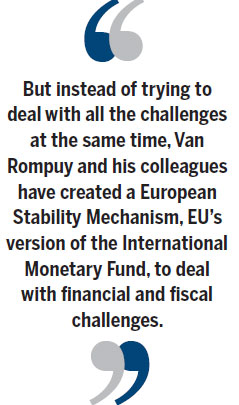Weighing the Van Rompuy years of EU
Updated: 2014-10-31 09:46
By Fu Jing(China Daily Europe)
|
|||||||||||

Despite a 'stormy' tenure, the departing European council president helped to financially stabilize Europe
Five years ago, when the Lisbon Treaty came into effect, Brussels had great ambitions of building a "United States of the European Union". It appointed Herman Van Rompuy the first permanent president of the European Council to oversee the longer-term issues and act as a low-profile consensus builder within the EU.
At that time, one year after the collapse of Lehman Brothers, Europeans had been fervently complaining against the woes inflicted on them by Wall Street bankers as financial panic swept the world. The EU hoped the G20 meetings and the Copenhagen climate conference would help rebuild global governance. But a year later, the eurozone encountered another debilitating problem: the debt crisis. It started in Greece and spread to Portugal, Spain, Italy and other EU countries.
Soon, Van Rompuy and his fellow EU officials refocused the agenda on creating a firewall against the debt crisis, mobilizing resources to bail out the debt-ridden countries and stabilizing the economies by boosting growth and creating jobs.
Delivering his farewell speech (his second term as EC president ends on Nov 30) at a meeting of EU leaders on Oct 24, Van Rompuy said history would be the best judge of the last five "stormy" years, although he conceded that the EU's social and economic problems are not over. An economist by training, Van Rompuy knows well the state of the EU he will exit.

Think tanks, opinion leaders and the media have been highlighting the problems facing the EU. Bertelsmann Stiftung, a Germany-based think tank, says in its Social Justice Index 2014 that the gap between civic participation in the still wealthy countries of northern Europe and the crisis-struck southern nations has significantly increased over the past years.
The German think tank also says that, while social injustice in countries such as Greece, Spain, Italy and Hungary has increased since 2009, the Nordic countries - Sweden, Finland and Denmark - lack equal labor market access opportunities for migrants. Besides, the efforts made by Sweden and Finland to reduce the high rate of unemployment among youths have not been successful. In Sweden, 23.5 percent of youths are unemployed; in Finland, 19.9 percent. With such high unemployment rates, Nordic countries also face the problem of brain drain.
An article in the latest issue of Washington-based Foreign Affairs talks of a potent major problem: a catastrophic skill shortage. Despite an extremely underutilized labor force, about 27 percent of the jobs created in the major European economies each year lie vacant because of lack of skilled workers. The article also says that by 2020, the continent's digital sector alone would be short of 900,000 professionals, whereas the dynamic German economy would face a shortage of 1 million workers skilled in science, engineering, mathematics and technology because skilled professionals have chosen to leave the continent amid the financial and debt crises.
Europeans are facing difficulties also because their politicians have conflicting views on fiscal and monetary policies. While France, Italy and some other countries insist on expansionary fiscal and monetary measures to stimulate their economies, Germany still swears by austerity. European politicians have been trying to strike the right balance between their one-size-fits-all policy and the diverse situations faced by the 18 eurozone countries, which have individual fiscal sovereignty.
Externally, the EU's biggest challenge now is the sanction- and anti-sanction game with Russia because of the Ukraine crisis. European leaders should not forget that the EU is a peace project, and if not dealt with carefully, its eastward expansion - which includes Ukraine's entry into the bloc - would ignite a regional conflict with Russia because of geopolitical concerns.
But instead of trying to deal with all the challenges at the same time, Van Rompuy and his colleagues have created a European Stability Mechanism, EU's version of the International Monetary Fund, to deal with financial and fiscal challenges. With the capability of issuing 700 billion euros ($887 billion) in loans, the ESM can respond to any financial crisis in time and reduce the EU's dependence on the US dollar. It is this mechanism that will go down in history as the greatest achievement of Van Rompuy and his colleagues in the "stormy" five years.
The author is China Daily chief correspondent in Brussels. Contact the writer at fujing@chinadaily.com.cn
(China Daily European Weekly 10/31/2014 page13)
Today's Top News
Russia 'willing' to co-op with Ukrainian parliament
China to help build Ebola quarantine center in Liberia
Tycoons' gift to Yale stirs debate
180 'foxes' hunted back to China
UN chief deplores planned elections in E Ukraine
Overhaul of anti-graft legislation on the way
Germany to bid for 2024 Olympics
Russia to build railroads in DPRK
Hot Topics
Lunar probe , China growth forecasts, Emission rules get tougher, China seen through 'colored lens', International board,
Editor's Picks

|

|

|

|

|

|





